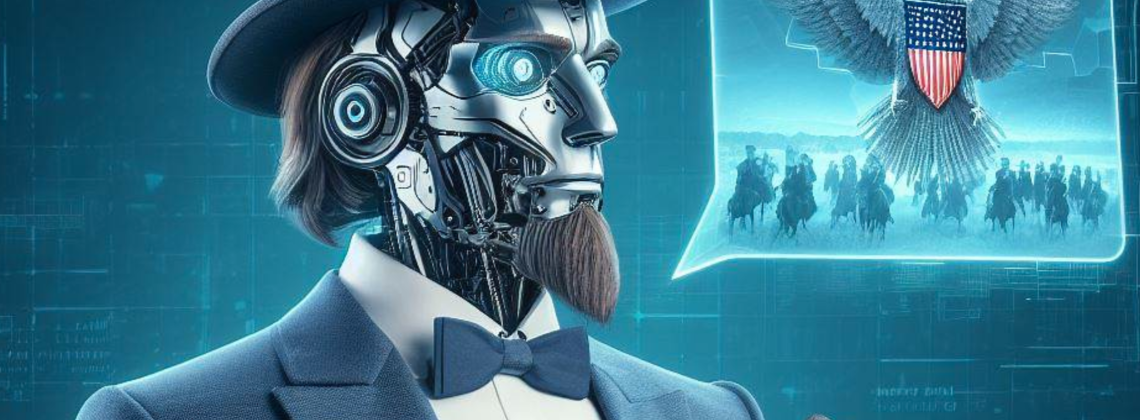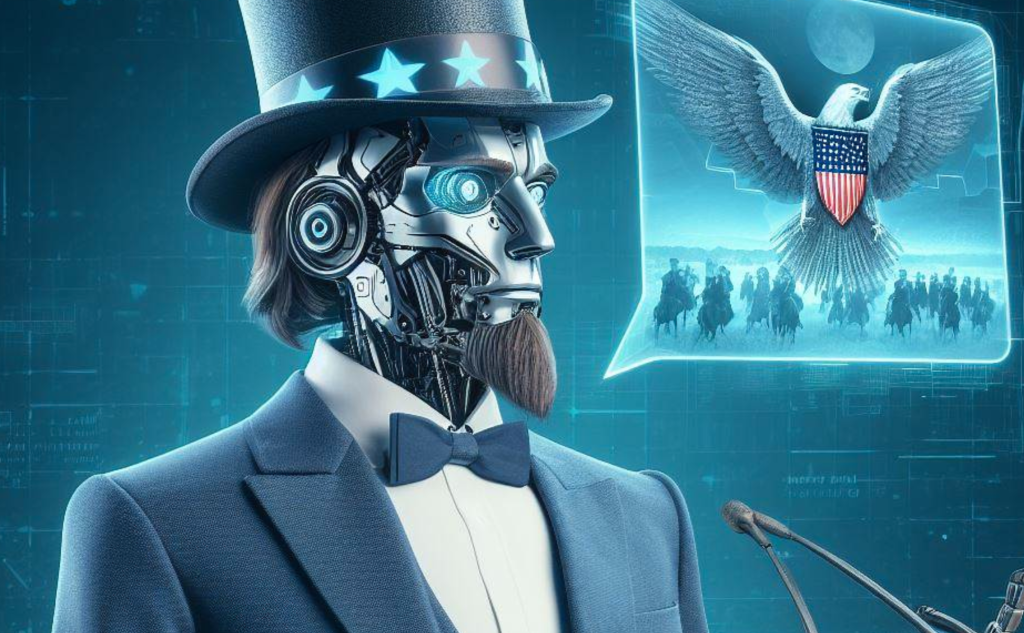

Lincoln anticipated what AI cannot: the need for a new path
Thankfully, artificial intelligence wasn’t around when Abraham Lincoln wrote the Gettysburg address, which will reach its 160th anniversary on November 19. But if AI had been around in 1863 and had written the Gettysburg Address, one thing is certain: The speech would never have sounded like the one Lincoln gave.
When writing an essay, generative AI programs (such as ChatGPT) comb the internet looking for every imaginable scrap of writing that might be relevant to the subject and genre of the work they are asked to create. Then they produce something that reflects the average of all that work. If asked to write a college-level essay on a particular topic, an AI program will produce a generic paper that repeats the phrases and organizational layout of the type of essay that an experienced college instructor has probably seen thousands of times before.
So, if AI had existed in 1863—and if a computer program had been asked to write a speech for the ceremony commemorating the fallen soldiers at the Gettysburg battlefield—it would have combed through the numerous commemorative speeches that were available and then produced an address that mimicked the expected style of the time.
The speech would have been verbose and flowery. It would have been long. And it would have been hagiographic in its depictions of the courage and valor of the deceased veterans.
In other words, it would have sounded a lot like Edward Everett’s Gettysburg address.
Immediately before Abraham Lincoln gave his speech at Gettysburg, the man who may have been considered the greatest American orator of the time, Massachusetts politician Edward Everett, addressed the crowd with a warmup oration. During his career in public life Everett had been a Harvard professor, pastor of a prominent Boston Unitarian church, and U.S. senator. When Ralph Waldo Emerson heard him preach, he described his voice as the “most mellow and beautiful” he had ever heard. His ability to enthrall audiences was legendary. He seemed like a good choice to address the crowd immediately before Lincoln’s remarks.
Everett spoke for two hours at Gettysburg, and his speech touched on all the expected themes. He compared the fallen soldiers to those who had died for their country in ancient Athens or Rome. He spoke of his admiration for the “brave and patriotic men who fill these honored graves,” and declared that “As my eye ranges over the fields whose sods were so lately moistened by the blood of gallant and loyal men, I feel, as never before, how truly it was said of old that it is sweet and becoming to die for one’s country.”
Given the oratorical standards of the time, Everett’s speech was ideal. Lincoln’s speech, by contrast, contained no such flowery phrases or saccharine sentiments. By speaking for only two minutes he shocked the audience with his brevity.
But perhaps his greatest innovation was in recognizing what Everett and other orators had not—and that surely no AI program could have recognized either. Lincoln realized that what was needed at a battlefield cemetery commemoration was not praise for the dead but rather a clear statement of what was at stake in the conflict in which they had fought. And this required a one-sentence summary of the nation’s founding and purpose. “Four score and seven years ago,” he began (in a phrase that sounded vaguely biblical even if it was not a direct scriptural quotation), “our fathers brought forth on this continent a new nation, conceived in liberty, and dedicated to the proposition that all men are created equal.”
Perhaps not since the Declaration of Independence had any American so succinctly and effectively summarized what the American republican experiment was all about.
In the next sentence Lincoln told his audience what the Civil War was about: It was a test of “whether that nation, or any nation so conceived and so dedicated, can long endure.”
And in the last sentence he left his audience with a stirring exhortation to do whatever it would take to preserve the nation, so that “this nation, under God, shall have a new birth of freedom, and that government of the people, by the people, for the people, shall not perish from the earth.”
These lines have since been memorized by millions of schoolchildren. They have been etched on the walls of the Lincoln Memorial. At the time, though, some people were not sure what to think. The London Times sneered: “The ceremony [at Gettysburg] was rendered ludicrous by some of the luckless sallies of that poor President Lincoln.”
The Times was correct in noting that Lincoln’s address did not conform to the conventional model of effective oratory. What it failed to see was that Lincoln had just forged a new path that would permanently change American speeches, and even Americans’ concept of the republic.
Synthesizing the Bible, the Declaration of Independence, and the American ideal of a democratic republic, Lincoln uttered phrases—“all men are created equal,” “this nation, under God,” “new birth of freedom,” and “government of the people, by the people, for the people”—that continue to define the United States today.
For his part, Everett realized he had been surpassed. “I should be glad if I could flatter myself that I came as near to the central idea of the occasion, in two hours, as you did in two minutes,” he told Lincoln.
But Lincoln had done even more than Everett imagined. He not only told his audience what “the central idea of the occasion was” but also what the central idea of the nation was. For the next century and beyond, Lincoln’s words would continue to be the defining guide to the meaning of the United States of America. We are a nation devoted to the equality of all people. We are “one nation, under God.” And we are a democratic republic that practices “government of the people, by the people, for the people.”
Lincoln convinced his audience that those ideals were worth dying for. The central issue in the Civil War was not battlefield courage and soldiers’ glory; it was instead the survival of the nation and its unique republican experiment.
An artificial intelligence program could never have read this moment so well because the orators of Lincoln’s time missed it. But in ten sentences, Lincoln did more than all the speechmakers of his time were able to accomplish. The result was a new American creed that still defines us and captivates our hearts.
Daniel K. Williams is a historian working at Ashland University and the author of The Politics of the Cross: A Christian Alternative to Partisanship.
Image Generated with AI ∙ November 16, 2023 at 9:21 PM
This brought me joy.